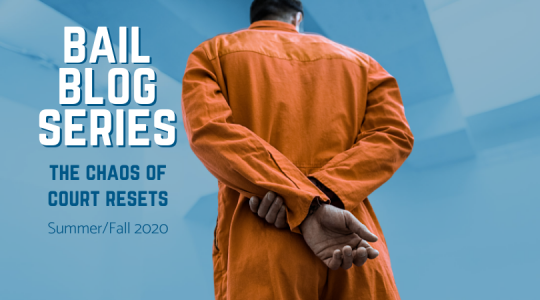
Dissecting the criminal justice system in a classroom always felt comfortably analytical. Built on a foundation of logic and reason with the end goal of order and peace, the system made sense to me. It seemed to be a desirable and right institution in a very chaotic and wrong world. But this sheen of reasonability hides the system’s creativity; its loopholes and bureaucracy work like snares against those whose wallets are too thin to cut themselves free. The webs of the system take years to unravel and understand, let alone remediate.
The extent of the law’s craftiness may never be fully realized, as it pervades the lives of those interacting with the justice system in different ways, for different ends. I have spent the past several weeks listening to the experiences of people who could not afford bail on their own but were released through non-profit bail funds. Of the many seemingly mundane procedures that the law morphs into huge hurdles, one came up too often to ignore: court resets.
***
“Reset” as it applies to courtrooms is synonymous with “reschedule”; a “court reset” is simply when a court date is rescheduled to a later time (this is also called a continuance). Resets happen for any number of reasons—courts face an overload of cases to manage, attorneys require additional time to prepare, or witnesses’ availability changes. However, some reasons run deeper than mere logistical management and point to a pattern of coercing guilty pleas.
My first exposure to the callous impact of court resets came in a NowThis video about people being held in Harris County jail for months, if not years, awaiting trial. Although they are legally innocent, their imprisonment is upheld through a cycle of resets that begins with high bond amounts; because these are people who can’t pay to leave the jail on their own, they have no option but to stay detained until their trial, whenever that may be.
From there, legal counsel often presents two choices to the individual: plead guilty or reset. Resets stack on top of each other, collectively adding months to nonexistent sentences. Court resets prolong the pretrial detention process for so long that an individual who has faced several resets may plead guilty in the hopes they can stop the cycle and move on with their life. But that guilty plea itself can pose long-term barriers to employment, housing, education, social services, and civic participation—insidious repercussions of the reset system.
***
Court resets are a crooked tactic of the justice system on a normal day, but the coronavirus pandemic has substantially increased their prevalence and impact. Due to sanitation concerns, Harris County courts have been largely closed since March 24, 2020. This means that anyone with a court date scheduled for this summer has seen it pushed off for at least a few months. But with no clear end in sight to the pandemic, new court dates of late August, September, and October function more as placeholders for the word ‘unknown.’
This keeps people in jail for longer periods of time if they can’t make bail, and it makes it harder for those who have paid bail to move on from their still-pending case.
Stories of the manipulative use of court resets came up in my own interviews with people recently released from Harris County jail. George*, a Houston-area resident, discussed how the courts have been continuously resetting his misdemeanor case for the past year. If he hadn’t been able to make bond, he likely he would have been detained until he pled guilty. As it is, he is trapped in the cycle of resets, unable to put the case behind him.
***
More recent resets may seem to be the unfortunate consequence of a pandemic that, really, is out of the anyone’s hands. But we’re seeing an additional problem compounding the chaos: a deliberate lack of transparency and information communicated to individuals with pending court dates. Some courts are not notifying people that their dates have been reset. With a previously confirmed date and no knowledge of changes, people are still going to the courthouse—only to find it closed. Lance*, another Houston-area resident I interviewed, was one of these people, taking an hour-long commute to a court date that didn’t exist.
“I didn’t even know they were closed for sanitation. I was there for an hour… [A policeman] just happened to be walking by… and I was like, ‘What’s going on?’ and he’s like, ‘Oh, we’re closed.’ Well, hell.” Lance relied on the information of a policeman passing by because the court buildings had no signage or indication of closure. “Nothing. It just says ‘Court’ with an arrow facing the door.” During our interview, Lance’s frustration was palatable. It doesn’t cross the mind of someone in the middle of a global pandemic and personal crisis that courts may be withholding information critical to their reintegration. It makes these buildings look more like traps than courtrooms.
My interview with Lance ended on a harsh reality of court resets and their effect on the cash bail system: “I guess it’s another way to make somebody do something just because.”
*Personally identifiable information, such as names and charges, have been altered to protect individual privacy.
This blog post is part of a series sharing first-person accounts of the bail system in Harris County. Through interviews with system-impacted people, the author explores stories of the local justice system. Read the first post in this series here.
